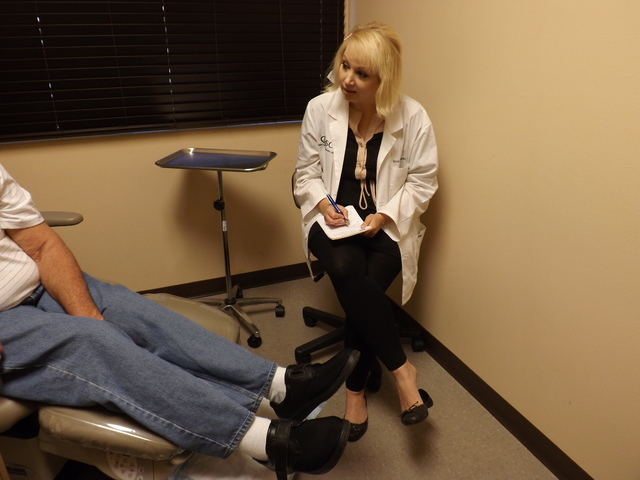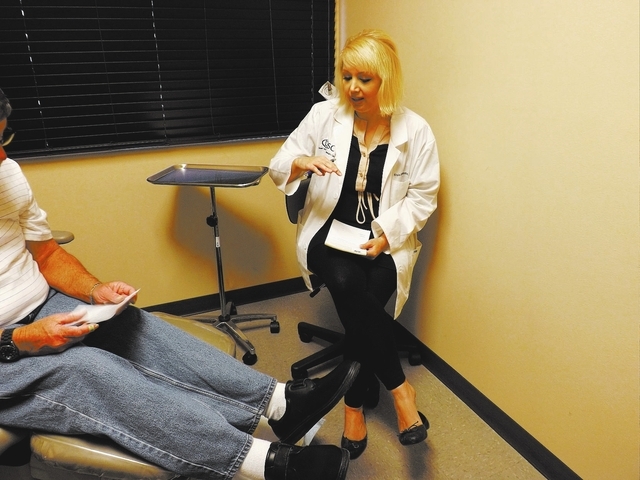Doctor stresses importance of foot screenings for diabetics
Cotton swabs, bandages and metal instruments are neatly arranged on the counter in an examination room at the Desert Institute of Specialty Care, 9339 W. Sunset Road, Suite 100.
“It looks like we’re going to play today,” said patient Tim Ryan. “You can always tell when there are tools on the table.”
Although American Diabetes Month was in November, podiatrist Dr. Nicole Dalessandro continues to stress the importance of diabetic foot screenings.
Ryan, a diabetic patient, has been under the care of Dalessandro for about two months.
“(Ryan) was already a patient of another doctor at the practice, but I popped in the room when I heard he was diabetic and had some foot issues,” Dalessandro said. “I’m glad I did.”
During her initial visit, Dalessandro discovered that Ryan, 58, had an ulcer forming under a callus on a toe on his right foot.
“If it weren’t for her, there’s a good chance that my husband would have lost his toe,” said Ryan’s wife Patricia. “I was treating what we thought was just a blister, but it turned out to be much worse.”
Dalessandro ordered blood work and X-rays to make sure an infection hadn’t spread to Ryan’s bones.
“I saw him once a week to remove the dead, thick skin,” Dalessandro said. “The reason being is that if we left it on, it increases the pressure in the area and can cause another ulcer.”
Diabetes is a group of metabolic diseases in which a patient has high blood sugar because the body does not produce or respond to insulin.
“High blood sugars affect everything from your organs, your eyes, your vessels and your nerves,” Dalessandro said. “With diabetic patients, they’ll start to get a lot of nerve symptoms and not even know it, especially in their feet.”
According to Dalessandro, there are three types of diabetes: Type 1, Type 2 and gestational diabetes. Type 1 is commonly referred to as juvenile diabetes, though it doesn’t always occur in childhood. Type 2 diabetes usually occurs in adults after patients wear out the islet cells in the pancreas that regulate blood sugar.
“Type 1 diabetes patients tend to need insulin shots, whereas Type 2 diabetes patients do not,” Dalessandro said. “Women can also be diagnosed with gestational diabetes that occurs during pregnancy.”
The disease can be caused by a combination of factors, including diet, lifestyle, genes and the environment. Symptoms range from dizziness or jitteriness to sweating, frequent urination or blurred vision.
Ryan was diagnosed with diabetes about five years ago and said it runs in his family. His mother, father and sister also have Type 2 diabetes.
“My brother is the only one in my family who doesn’t have it,” Ryan said.
According to Dalessandro, diabetes is increasing in the country’s population, especially as obesity rates increase.
“I’ve seen statistics that say between 3 to 5 percent of the population has diabetes,” Dalessandro said. “That’s a significant amount, and all of them should be getting foot screenings.”
During her examinations, Dalessandro looks for poor circulation or reflexes, loss of sensation, skin infections, calluses and more. Early detection of these symptoms can prevent ulcers or fungal infections.
“Like you go to the dentist twice a year, diabetic patients should be seeing a podiatrist,” Dalessandro said. “We want to practice preventative medicine and catch the problems before they occur.”
For more information, visit discspecialtycare.com or call 702-630-3472.
Contact Southwest/Spring Valley View reporter Caitlyn Belcher at cbelcher@viewnews.com or 702-383-0403.






















